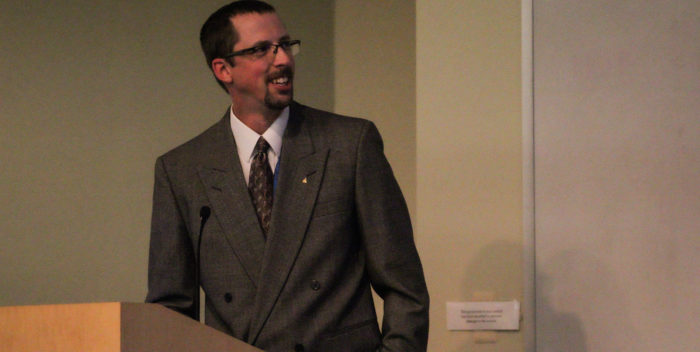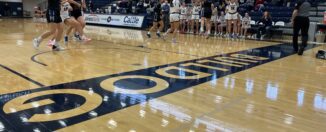Professor Presents Casey Anthony Case
Dr. Huntington gives a presentation about his work on the Casey Anthony Case. Photo by Lyric Allen.
By Kaytlyn Kindschy
Members of CUNE’s Law and Justice Club, students and citizens of the Seward community gathered in Thom Auditorium on Wednesday night, Oct. 23, to hear about the experiences of Concordia’s own Associate Professor of Biology and Criminal Justice Tim Huntington while he was working on the Casey Anthony murder trial.
The Casey Anthony investigation began in 2008, in the state of Florida. Casey Marie Anthony’s 2-year-old daughter, Caylee Marie Anthony, had been missing for 31 days without any report being made by her mother. Cindy Anthony, Caylee’s grandmother, had reported that she had not seen her granddaughter for 31 days and she suspected her daughter, Casey, had something to do with her whereabouts. After multiple holes were found in Casey Anthony’s story, she was a prime suspect in the murder of her daughter and after years of investigation, she was put on trial.
Since Florida is home to “The Sunshine Law,” the public has access to everything that happens within the state’s government. Naturally, media coverage on this case was nationwide and grabbed the attention of people across the country.
Huntington is a forensic entomologist, which means he’s an expert on the use of insects as evidence. The bugs that are found and studied are used to determine the post-mortem interval, or how long a body has been decomposing. He explained to his audience that when victim Caylee Anthony’s body was found and the evidence was finally studied, the only bugs that were found on the body at the time of discovery were “late-arriving” bugs.
“There are different bugs that show up on a dead body during the stages of decomposition and there were no early-arriving bugs at all,” Huntington said. “This means that the body began decomposing somewhere else and was moved to the scene later.”
The investigation of this case went on for almost four years before it was brought to trial. Huntington was the first forensic expert to testify for the defense. His testimony lasted for approximately seven and a half hours.
“Testimony is one of the most stressful things a forensic scientist does,” Huntington said.
The public knew what the state’s initial theory was, thanks to the Sunshine Law, which caused the state to decide not to test for DNA in order to avoid going back on their theory. The lack of evidence on the state’s side led the verdict to read that defendant Casey Anthony was not guilty on all accounts of the death of Caylee Anthony.
“This is a win for the justice system,” Huntington said, “If she was convicted, you should be deathly afraid because you could be prosecuted for anything too.”
Huntington shared that due to the immense coverage in the media, he received numerous emails and phone calls with different opinions of and reactions to his testimony and his time working with the defense. This experience in the field is only one of many for Huntington.
“I wanted to come listen to his talk because I remember this case,” junior Malena Goldenstein said. “I thought it was great and hearing from someone who was in the midst of the case was very interesting.”
The Casey Anthony case is still an open case and under investigation after more than 10 years because there is no stated cause of death of Caylee Anthony and no one has been convicted of her murder.
“The circumstances around a case and the circumstances of a death is what makes it interesting and out of the ordinary,” Huntington said. “If there is an interesting bug discovered during a case, that makes it more interesting for me.”
Huntington has been teaching full time and sharing his expertise at Concordia since 2008 and still currently works part time for the Seward Sheriff’s Office.














